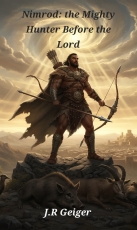
Book by: J.R. Geiger
Genre: Non-Fiction
Life in Erech had settled into a rhythm of faith and humble industry. The air was pure, the people were devout, and Nimrod, the hunter-king, ruled by example and guidance. Yet, the same restlessness that had drawn him away from Noah’s original settlement began to stir again. It was not doubt, but the whisper of divine mandate. “Be fruitful and multiply, and fill the earth” (Genesis 9:7).
The Northern Calling
Nimrod spent many nights gazing northward, toward Assyria. He knew he was being called to push the covenant further. “From that land he went into Assyria and built Nineveh, Rehoboth-Ir, Calah, and Resen” (Genesis 10:11–12).
He told the people of Erech: “The Lord has blessed this city, but the command is to spread, not to stay rooted in comfort.” His departure was met with sorrow, but not resistance. His people understood his strength was tied to obedience.
The Founding of Nineveh
The journey north was arduous. They relied on Nimrod’s skill as a mighty hunter and God’s providence. “Like Nimrod a mighty hunter before the Lord” (Genesis 10:9).
Finally, they descended into the fertile valley of the Tigris. Nimrod chose a commanding spot on the riverbank and declared the new city Nineveh. Unlike Babel, Nineveh was built on solid rock, designed for defense and stewardship, not pride. “Unless the Lord builds the house, those who build it labor in vain” (Psalm 127:1).
Nineveh became a stronghold of covenant life, a beacon to the wilder north. Nimrod ruled justly, reminding his people that strength must kneel in service. “Whoever wants to become great among you must be your servant” (Matthew 20:26).
The Northern Kingdom Takes Shape
Nimrod did not linger. Using Nineveh as a base, he directed the founding of three more covenant cities:
- Rehoboth-Ir: A sprawling agricultural community, dedicated to stewardship of the earth. “The Lord God took the man and put him in the garden of Eden to work it and keep it” (Genesis 2:15).
- Calah: A defensible outpost, echoing Noah’s lesson of protection. “The name of the Lord is a strong tower; the righteous run to it and are safe” (Proverbs 18:10).
- Resen: A hub of administration and unity, ensuring scattered settlements remained connected. “How good and pleasant it is when God’s people live together in unity” (Psalm 133:1).
Nimrod’s work in Assyria was the culmination of his kingship. He was now the founder of a four-city kingdom, built on defense, provision, and humility. His name was etched into the geography of the world.
His final act of building complete, Nimrod rested. He was the mighty hunter before the Lord, a faithful servant who had fulfilled the covenant command. He had built a network of righteous cities far from the pride of Shinar. The hunter-king was still following the rainbow. “I have set my bow in the cloud, and it shall be a sign of the covenant between me and the earth” (Genesis 9:13).
© Copyright 2026 J.R. Geiger. All rights reserved.
Regular reviews are a general comments about the work read. Provide comments on plot, character development, description, etc.
In-line reviews allow you to provide in-context comments to what you have read. You can comment on grammar, word usage, plot, characters, etc.
So basically he is setting up an empire that follows the teachings of Noah. Nimrod is a shrewd survivilist and knows how to ensure defense, communications and agricultural supplies to keep everyone well fed, healthy and happy. A great leader and master tactician. I like this interpretation of who he was and what he did.
Thank you M!
Watching the History Channel when they talk about Scripture and the people back then sometimes leaves a lot to be desired.
Nimrod was always used as a slam against someone who did something stupid.
Scholars claimed he was a tyrant and revel against God.
Writing this book, I like my interpretation of Nimrod and I believe it's probably more accurate than what's been claimed by "scholars".
Morag Higgins